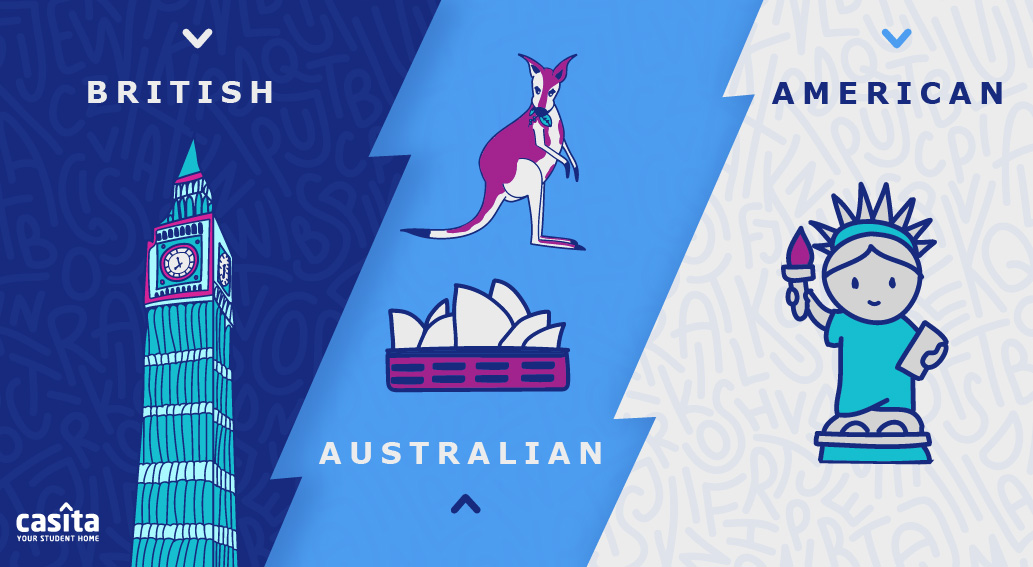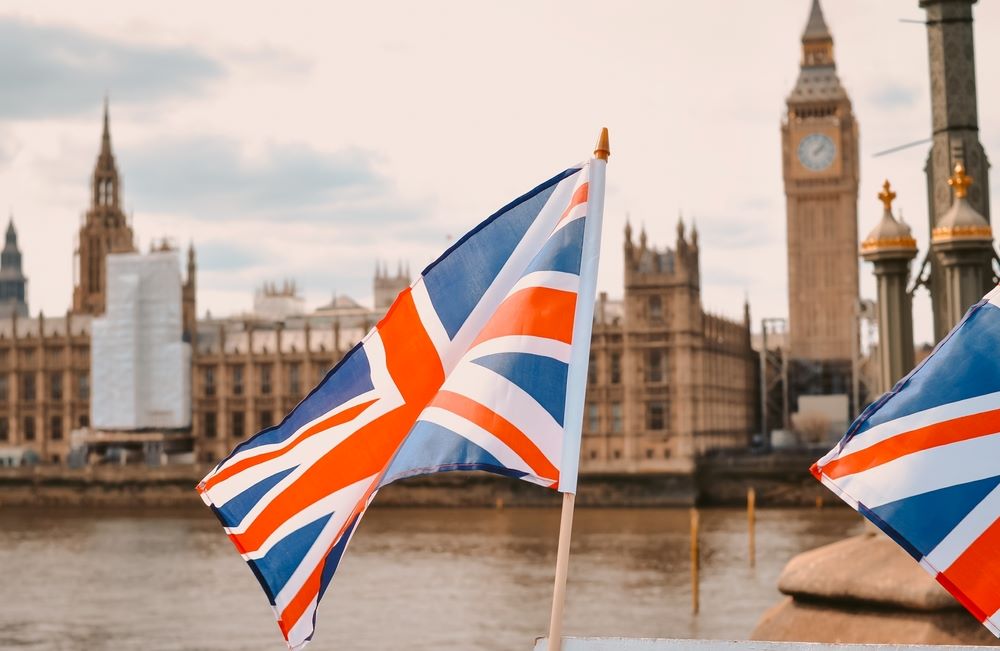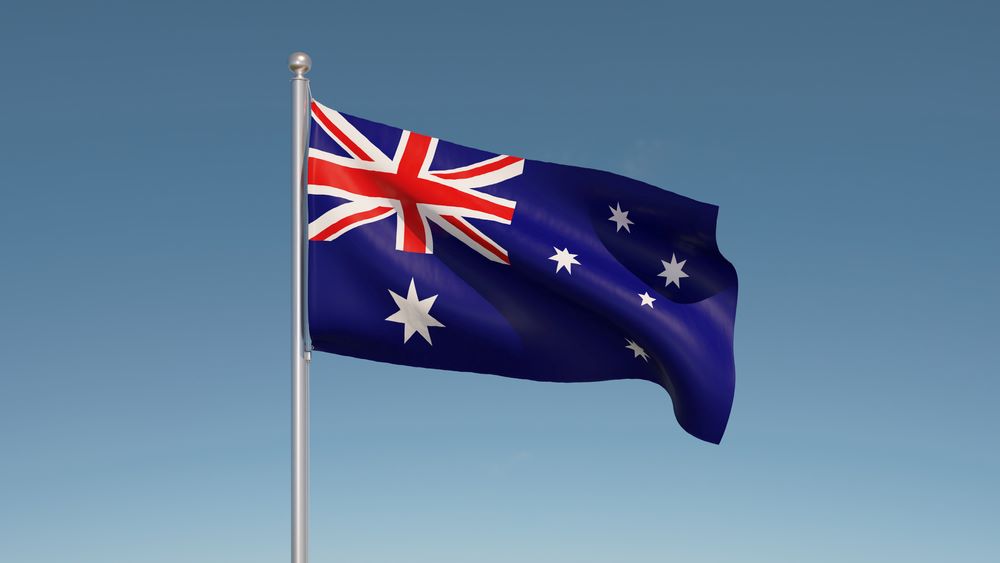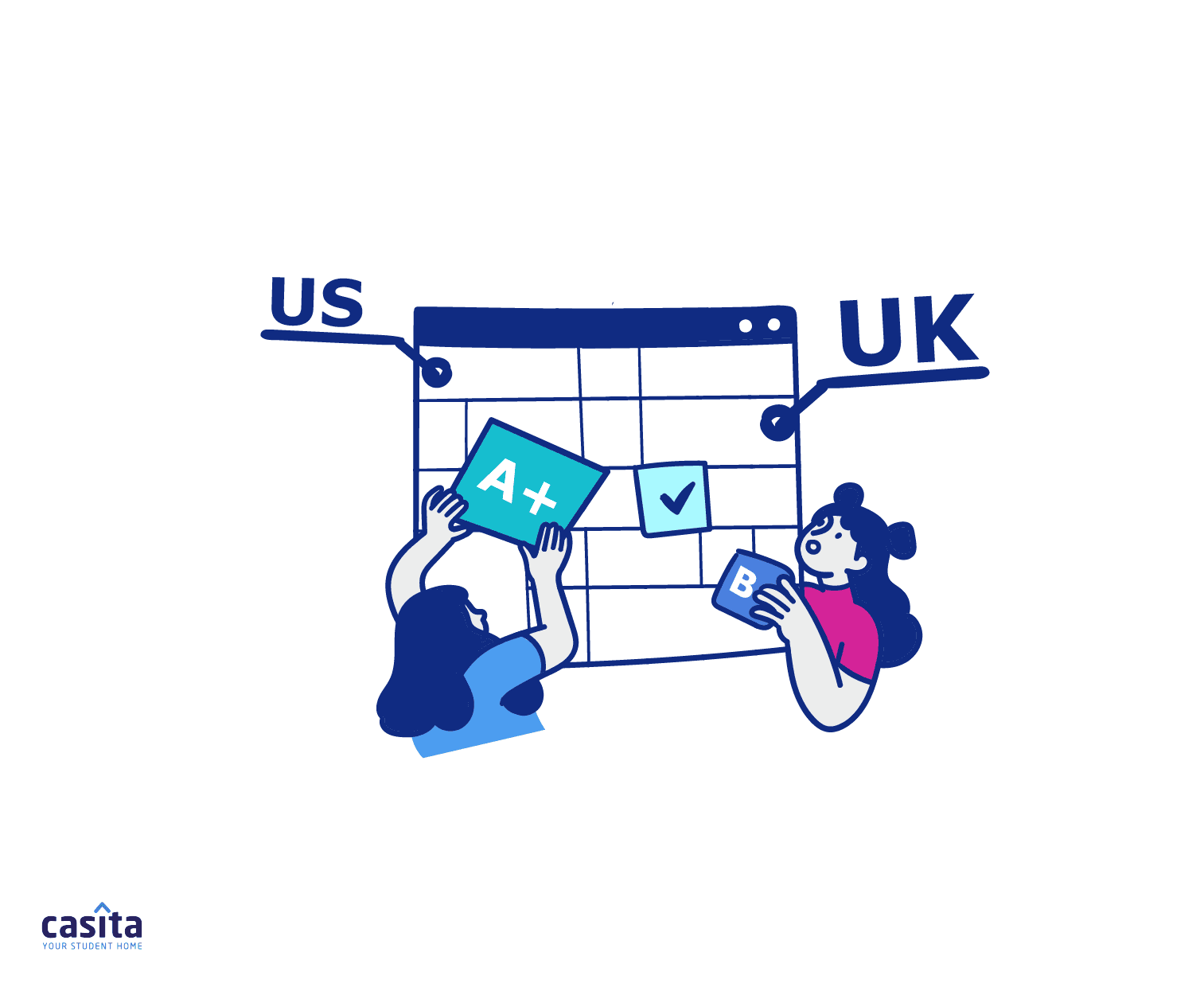British vs Australian vs American English: A Full Guide
Tips and Advice
Exploring
8 mins read
Share

Updated at: 25 November, 2025
Published at: 05 August, 2019
By Samir Badawy
British vs Australian vs American English: A Full Guide
Tips and Advice
Exploring
8 mins read

Updated at: 25 November, 2025
Published at: 05 August, 2019
By Samir Badawy
Share
British, American, and Australian English are among the most recognisable forms of English, with British English being the closest to the original language. All dialects, however, are easily understood by the other dialect speakers, with a few exceptions, such as pronunciation and a difference in slang words. In this full guide, we’ll break down everything you need to know about the differences between British, Australian, and American English..jpg)
History
English is an Indo-European language of Germanic origins, with its closest languages being Flemish, Dutch, and German. Throughout the years, English has developed itself as the Lingua Franca or the world’s dominant language, with most foreign trade and diplomacy being conducted in this language.
English, as we know it, which has its roots in Britain, is officially spoken in the United States, the United Kingdom, Canada, Australia, Ireland, New Zealand, and the various Caribbean Sea and Pacific Ocean nations. It is also the official language of multiple countries, such as South Africa and India.
British English
The English Language initially developed during the fifth century with the arrival of the Anglo-Saxons to Britain. The name England itself originates from the word Eng., which refers to Anglo, and land, which relates to country; put together, they mean the home of the Anglo-Saxons.
Prior to the arrival of the Anglo-Saxons, it’s believed that the language spoken in Britain was the Celtic language, a language still spoken in various parts of the United Kingdom. Germanic tribes, most notably the Saxons, arrived with their mother tongue in 449AD, and after the locals moved north, the language spoken by the Angle tribe, called English, started spreading in the south of England. This version of English is called Old Engish, with Beowulf being its most notorious literary piece, written around 700 to 1000 AD.

After Old English came Middle English, which has been characterised by its large French influence and its Latin influence after the Norman invasion in 1066 by William the Conqueror; at this time, French became the administrative language of Britain.
By that time, the Middle Language was developed with the introduction of more than 10,000 French words. Middle English lasted between 1150 to 1500 AD. This led to the first steps towards Modern English after the development of what’s known as Late Middle English. Late Middle English began with the disappearance of French, most notably French official documents in the 1430s. This transition period lasted until the 15th century when what’s known as Chancery standard English was developed in the mid-15th century, succeeded by the Bible’s translation in the dialect later on in the 15th century.
Early Modern English is often referred to as Shakespearean English and was primarily influenced by this time period’s most famous playwright who is William Shakespeare, who helped revolutionise the language as well as adding more than 1500 new words to the English language, most of the writing in early modern English is understandable to modern-day readers; however, it is still distinct from today’s common English.
Modern English developed with the expansion of the British Empire in the 16th century and later during the Industrial Revolution when new technology-related terms were introduced. The need to describe new technologies and their functions have introduced more richness and complexity to the English language.
Today, the British English dialect draws various words from other neighbouring countries or countries which have been in contact with Britain, such as French, Latin, and Greek. Other factors contributing to the uniqueness of British English are the influence of immigration and colonisation on the language.
The UK’s diverse population speaks more than 300 different languages, which will keep enhancing the English language further and further; not only that, but also, thanks to the interconnectivity of the world, all countries are influenced by others, which affects word choice, preferences, trends, and more.

American English
American English developed from the British accent but started to drift apart from British English around 1720; the difference was first primarily commented on in 1756 when it was noted in Samuel Johnson’s dictionary that American English is different from British English while providing examples. The American accent was often ridiculed by the Brits as it heavily relied on contractions which act to shorten long words, such as the use of “ain’t”, which stands for “am not”.
The American English dialect also used obsolete British words, such as their use of “Fall”, which has been replaced by “Autumn” in Britain. American English also involved newly created words unique to the American English dialect, such as “Groundhog”. Multiple foreign languages spoken by immigrants have also helped shape the American English Dialect as well as the Native American language; all these languages helped add more words to the American English dialect, adding more distinction there. With each settlement, the variations grew even further.
The 19th century is when the American English dialect saw the most change; however, during this time, there was an emergence in Grammar Schools which helped the public read and write and was the equivalent of an elementary school. The 19th century also witnessed the rise of various American literary figures, such as Mark Twain and the poet Edgar Allan Poe.
Today, the Common American Language has various regional dialects, with the most significant being: Southern, New England, New York City, and Midwestern. These language variations also stem from the immigrant groups located in the city and the movement of groups across the USA, creating a unique language mixture.

Australian English
Australian English first developed when the first settlers arrived in Australia back in 1788. It is commonly believed that the Australian accent developed as a result of the blending between the accents of the first settlers, which were most notably British and Irish. The Australian accent origin is the blend of all the setter’s previous regional accents from the United Kingdom.
The three main distinctions in the Australian English Language are the Broad Australian, the most local type; General Australian, an intermediate accent between the Broad and Cultivated Australian; and the Cultivated dialect, the most British sounding.
These three mentioned dialects are characterised by changes in vowel pronunciation, and over the last forty years, there has been a shift towards the General accent regarding the younger generations. The Australian English dialect is a relatively new one, having only developed over 200 years ago from standard British English.
British English Slang
British slang and UK slang draw influence from its various ex-pat groups as well as pop reference figures; some of the most iconic and common British English words and phrases include “alright?” which means, “How are you doing?”, this is in comparison to the American word for “alright”, which means “good”.
The words “Bloke” and “Lad” are also used to refer to guys, with bloke having the American slang word “dude” as a synonym and Lad referring to a younger guy. “Innit” is another slang word popularised by the fictional character Ali G which has roots in Jamaican and Asian communities and refers to “isn’t it?”. Other British slang words are as follows:
Quid: British Pound
Dodgy: Suspicious
Bevvy: Drink
A cuppa: a Cup of Tea
Bloody: Too much
Fiver: Five-pound note
Tenner: Ten-pound note
Proper: Alternative to “very” or “extremely.”

Australian English Slang
Slang Australian words are unique as they are often made up of shortened words, words influenced by cultural references, with some terms understandable to the average English speaker and others only understood by proper Aussies. Some of the most common Australian slang words include:
Arvo: Afternoon
Bail: Cancel plans
Bathers: Swimsuit
Billy: Teapot on the outdoor fire
Bogan: Someone who’s not very sophisticated
Brekky: Breakfast
Biccy: Biscuit
Reckon: For sure
Straya: Australia
The Aussie slang tends to use wit as well as shortening words; an example of this is “Barbie” for barbecue, “Devo” for devastated, “Defo” for definitely, as well as “Rellie/Rello” for family members and relatives.
There are some similarities between British and Australian slang, with both of them using similar slang words such as “Bloody” to express something in excess or too much and the expression “Mate” to describe a friend.
American English Slang
American English slang is among the most popular worldwide thanks to the USA’s large television, media, movie, and music scenes in the world and influence slang worldwide which includes Australia and the UK. Some of the most common American slang words which are universally understood by English speakers include:
Awesome: Wonderful
Cool: Great or fantastic
Sure: Used instead of “certain.”
Beat: To win over
Whatever: Used to show there are no limits or to show non-interest
In: Trendy
To hang out: To go out with someone
To drop by/in: To pass by in an unscheduled visit

Pronunciation Differences
British English and Australian English are the most common when it comes to both pronunciation and grammar. Bear in mind that Australia was colonised 200 years later than the USA, resulting in a closer similarity between it and British English as opposed to American English which developed a more different pronunciation and spelling. When looking at the significant differences between Australian English, and British English, we will see the following:
British and Australian English tend to have softer “R”s compared to American accents that typically pronounce the R. Such as “car”, which has a hard R sound in the American English pronunciation and an A sound in the Australian and UK accent.
If you’re wondering if there would be a difference if we look at British English vs Australian English, then the answer is yes. The Australian accent tends to elongate the A, such as Car being pronounced “Caah” in Australia and “Cah” in the UK; Australians usually swap their Ts with Ds. An example of this is “Better” being pronounced “Bettah” in the UK and “Beddah” in Australia
In Australian and British English, the “T” is typically pronounced as “Tj”, while it is just pronounced as a “T” sound in the USA. An example of this is Youtube being pronounced “Youtjube” in the UK and Australia, while it is simply pronounced as “Youtube” in the USA.
Another difference between British and American English vs Australian English is how they pronounce their O sounds, with Americans opting for an A sound, an example of this is the word “Sorry” being pronounced “Sorry” in the UK and Australia with a heavy O sound compared to the USA that pronounces it as “Sarry”.
Another significant difference between the accents is how each country pronounces the O sound at the end of each word; in the UK and Australia, an O is replaced by a softer “EU” sound compared to the hard O sound used in the USA. With that said, in the USA, “No” is simply pronounced as “No”, while in the UK and Australia, the word “No” is pronounced “Neuw” in the UK and “Neuh” in Australia.
Spelling Differences
British/Australian English is quite similar regarding the spelling of words as opposed to American English when it comes to spelling. When comparing the spelling of all previously-mentioned dialects, we can observe the following from looking at British English vs American English Spelling or American English vs Australian English; the main differences are as follows:
Australian/British English Spelling | American English Spelling |
Adopting an “S”:
Adopting “OUR”:
| Adopting a “Z”:
Adopting “OR”:
|
Adopting “LL”:
| Adopting “L”:
|
Fun Facts
The English language is a unique and valuable language to learn and is full of interesting facts; some of the language’s fun facts include the following:
The closest language to Old English was Old Frisian, with an 80% lexical similarity and is still the easiest language for English speakers to learn
French was the official language of England between the years 1066 to 1362
English has approximately 1.35 billion speakers worldwide
Each year, 4,000 new words are added to the English dictionary
You and I are the two most used words in the English language
The letter E is in 11% of all English words
Good is the most commonly used adjective in the English language
The first English dictionary was written in 1775, which is Johnson’s Dictionary
The original word for butterfly was flutterby
Town is one of the oldest English words still in use
At Casita, we highly recommend that our students learn the English language as it is the Lingua Franca of the world, meaning that it is used between different cultures to bridge the gap. English has also become an important language in world trade and business, and understanding the different variations is essential to understanding the different cultures speaking the language.
Tips and Advice
Exploring
By Samir Badawy
Share
Tips and Advice
Exploring
Updated at:
Published at:
By Samir Badawy
Share


